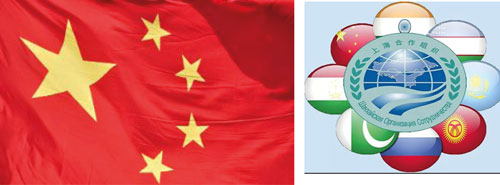China attaches great importance to the Shanghai Cooperation Organization (SCO). President Xi Jinping’s participation in the SCO summit in the Uzbek city of Samarkand tells everything, as this is part of his first foreign trip since the Covid-19 outbreak began. At the first in-person gathering of the grouping since 2019, Xi has a lot to discuss with counterparts from other countries involved in the SCO.
The SCO matters to China in multiple aspects. From China’s perspective, the platform first and foremost represents how international relations ought to be handled in the world today.
The initial aim of the SCO’s establishment in 2001 was to strengthen security cooperation as a way to combat terrorism, extremism and separatism. There have been regular military exercises within its framework, including the “Peace Mission” drills that involve all members. In this sense, the SCO bears some resemblance to the NATO. Fundamentally, however, it is different.
Over the past three decades, targeting the so-called threat from Russia has largely been the aim of the NATO, and its reckless eastward expansion was a main factor leading to the ongoing war in Ukraine. Worse still, the NATO doesn’t seem to have learned a lesson from its practice of cornering Russia. At its Madrid summit in June, it declared China a “threat” for the first time in history. By comparison, the SCO doesn’t pursue any geopolitical agenda against any country, which is a principle enshrined in its charter. Terrorism, extremism and separatism are the only common enemy of its member states. While the NATO’s expansion ended up increasing regional tensions, the SCO’s enlargement – its inclusion of Pakistan and India as full members in 2017 – paved the way for more regional stability. When tensions arise in the difficult relations between the two South Asian nations, the SCO is there to provide a platform to enhance dialogue.
Joint military drills at the SCO level are a rare chance for the two nations’ troops to engage with each other. The SCO is a platform where its members truly treat each other as equals, giving full play to the spirit of consultation. This is why the interests of all SCO members can be taken care of when it pushes ahead with its agenda. Anti-terror cooperation is certainly in the interests of every member state, so are the efforts made in promoting trade and cross-border investment, which has become another key pillar in the SCO agenda over the past decade or so.
By comparison, the NATO is arguably a platform hijacked by its most powerful member to maintain its global hegemony. This is why the interests and concerns of some European NATO members are sacrificed when the military alliance moves to escalate the tensions with Russia in response to the Ukraine war.
In the eyes of China, cold war mentality doesn’t belong to the current era. China believes ideological and political differences should not obstruct countries from seeking mutual respect and win-win cooperation. Unfortunately, this does not seem to be a popular mindset in the West nowadays. The SCO is where China has found partners that share similar worldviews. When it comes to Xinjiang, for instance, the alleged human rights violation has become a tool used by the US in a geopolitical game to weaken China. On the part of many other Western countries, there seems to be a lack of critical thinking on this issue.
Compared to the condescending West, SCO countries are in fact much better aware of what’s going on in the western Chinese region because of geographic proximity, cultural links and a shared memory about terrorist activities. The fact that none of them have raised this issue with China in and of itself tells a lot about the reality. Xinjiang is probably one of the safest places in China today following a successful anti-terror campaign. The security cooperation within the SCO framework deserves a lot of credit for making Xinjiang safer. And in return, China’s holistic approach in fighting terrorism may provide inspiration for other SCO countries.
In economic and business sense, the SCO is a huge opportunity for China. China’s trade with other member states expanded 20 times from 2001 to 2020, reaching $245 billion in 2020. Quite surprisingly, that figure represents more than a third of China’s trade volume with the EU, one of the country’s top trading partners, in the same year.
At a time when voices are on the rise in some countries about the need to reduce economic ties with China, like-minded SCO countries are a new engine for China’s foreign trade and outbound investment. More importantly, a message is being sent to the rest of the world that economic decoupling is not the way to go. SCO member states’ overall share in global trade jumped from 5.4% in 2001 to 17.5% in 2020. Behind the figures, there have been a lot of success stories, which might not have happened without SCO-wide efforts in seeking trade liberalization and economic integration.
An old Chinese proverb goes like this: If you drink with a bosom friend, a thousand cups of wine won't seem any; if you talk with someone who’s not on the same page, a few words would be too many. SCO countries are the ones that China wants to drink a thousand cups of wine with.
[The author is a host with CGTN Radio.]










